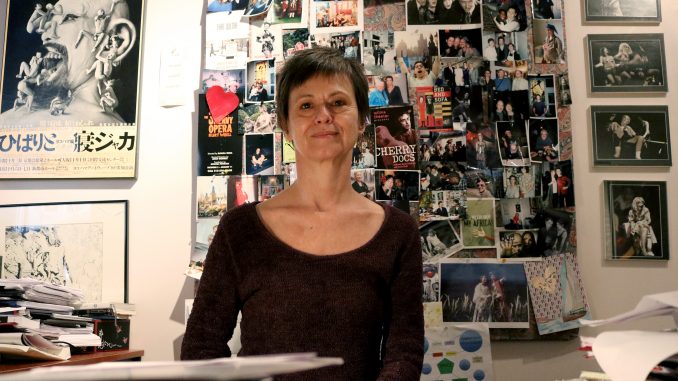
When artists risked imprisonment under the reign of communism in 20th century Europe, Blanka Zizka escaped to underground theaters in Prague.
Across the Atlantic and nearly a half a century later, Zizka is the Wilma Theater’s artistic director and co-founder. She was recently awarded $100,000 for her work in theater through the Vilcek Foundation, an organization that raises awareness of the contributions from immigrants in the arts and sciences around the country.
“The [Vilcek] Prize coming at this point in time not only elevates Blanka as the leader of the Wilma Theater but as a very important artistic figure in the Philadelphia community and also in the national and regional theater community,” said James Haskins, the Wilma Theater’s managing director.
“Blanka is a masterly director with daring vision and sensibilities,” said Shinnie Kim, program officer of the Vilcek Foundation. “And there is her dramatic immigration story.”
In then-Czechoslovakia, Zizka said there was a lack of information and influences, unlike all the material available to her now in the United States. But that deficiency taught her a lesson she brought to the shores of America after immigrating to Philadelphia in 1977.
“You are actually hungry for finding out more, so it gives you a focus,” she said. “You are hungrier than ever.”
That hunger still serves as her catalyst. In a day and age where regional theater falls victim to box office plummets, approach toward the artistic process becomes pragmatic, morphing into an “assembly line,” Zizka said.
When starting a new production, Zizka strips the text down to its authentic meaning. She encourages her actors to embrace this strategy, removing all layers to the “zero point.”
“As an actor, you need to lose all of your inhibitions,” Zizka said. “… We all create personas to deal with the world around us. We all create a little bit of a character to protect ourselves, and on stage, people can’t be hiding behind a character or props.”
Zizka said, however, freelancing instead of consistently working with a company can compromise finding this vulnerability, since the actors are physically and emotionally isolated from one another. She said she wants to “revamp the system” by maintaining a body of consistent actors through the Wilma’s “Hothouse,” which trains local artists through master classes and workshops taught by world-renown theater instructors.
Alongside implementing new techniques, Zizka said she wants to integrate international artists into the Wilma troupe, coinciding her hunger to explore uncharted territory onstage.
“Theater is actually one of the spaces where you can bring people of different color, different races together and create a piece that unifies everything,” Zizka said. “Maybe under the color of our skins we actually have much more in common … we need to talk about that ‘cause we’re constantly talking about differences, which polarizes the world.”
Last season, the Wilma produced “Hamlet,” featuring African-American actress Zainab Jah as the title character, which “expanded the pallet” by sparking an alternative way of thinking about the classical work, Zizka said. She also strives to recruit talent from the city and its surrounding areas.
Zizka’s unconventional aspirations for the Wilma have especially evolved since becoming the sole artistic director of the theater in 2010.
“I think that was a big opportunity and realization for her, that suddenly she had a little bit of a sense of freedom to develop her own vision, her aesthetic for the Wilma Theater that wasn’t in any way in conjunction with another person,” Haskins said.
“I think we need to risk and we need to go out there and try new things, because doing the old known and safe is not going to attract people,” Zizka said. “… So I feel we need to push the limits of what we think theater can be … it may be an idealistic goal, but that’s the way to do it. That’s the way I know to do it.”
Grace Maiorano can be reached at grace.maiorano@temple.edu.


Be the first to comment